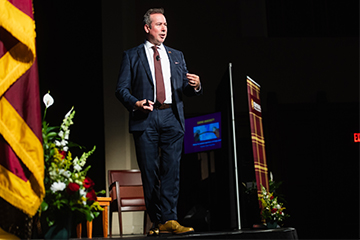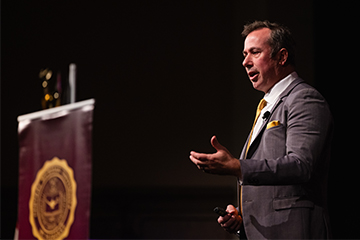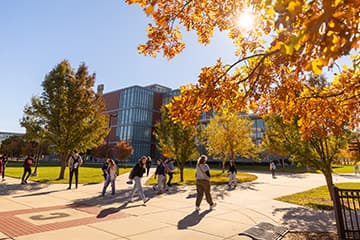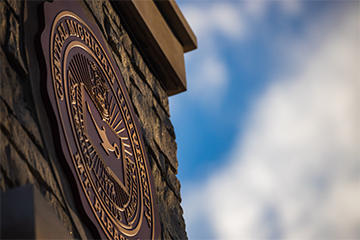Trustees announce selection of CMU’s next president
President Davies points to progress in annual report
The Central Michigan University Board of Trustees Thursday voted unanimously to appoint CMU’s 16th president, Neil MacKinnon, who will assume the role effective November 1. MacKinnon most recently served as Augusta University’s provost and executive vice president for academic affairs.
Trustee Denise Williams Mallett, chair of the presidential search committee, announced MacKinnon’s selection.
“We found a leader who not only possesses the academic credentials and leadership qualities necessary to lead our institution, but also embodies the values and vision that align with CMU’s mission and aspirations,” Williams Mallett said.
MacKinnon brings more than 25 years of higher education experience to his role as president-elect, including experience as a faculty member, department chair, center director, dean and provost. At CMU, he will maintain an active research program as president and will hold a faculty appointment in the College of Medicine.
MacKinnon thanked the presidential search committee, and the entire Board of Trustees, saying it was apparent to him that they all care deeply for CMU. The president-elect also thanked current CMU President Bob Davies.
“You are passing the baton with a university that is in fantastic shape,” MacKinnon told Davies. “Thank you for your six years of service. You and Cindy have been incredibly gracious so far in the transition, and I know that won’t end on November first.”
Davies also congratulated MacKinnon and his wife Leanne, assuring them that they will find CMU to be a very friendly place.
“I look forward to working with you and making sure you are extremely successful and continue to move this institution forward,” he said.
President’s report to the Board of Trustees
President Davies began his report by acknowledging and thanking Paula Lancaster, dean of the College of Education and Human Services, who has agreed to serve as interim provost. He said Lancaster continues to make a tremendous contribution to the university with her leadership.
Davies highlighted the accomplishments of students, faculty and staff at the start of the fall semester in his report to the Trustees. He also congratulated the College of Science and Engineering and College of Liberal Arts and Social Science for recent awards, grants and initiatives.
Davies said he was impressed by CMU’s new Career Outcomes Rate showing nearly 95% of recent CMU graduates are employed, continuing their education or participating in military or other service. He said it is a higher rate than nearly all of CMU’s peer institutions.
Newly released rankings from U.S. News and World Report show CMU in the top 10% of all 4-year universities in the country. Davies said, “This is a result of the dedication of our faculty and staff, and intense focus on successful outcomes for our students.”
President Davies also noted the CMU College of Medicine’s recent rankings by U.S. News and World Report for its service to rural and underserved areas.
“We are on track with the College of Medicine’s founding mission to educate physicians to provide comprehensive health care and services to underserved populations in Michigan and beyond,” Davies said.
Enrollment and retention success
In a report to the Academic and Student Affairs Committee on Wednesday, Vice President of Student Recruitment and Retention Jennifer DeHaemers said CMU’s overall enrollment is higher than the previous year for the first time since 2014. She said fall 2024 enrollment is up nearly 2% over fall 2023.
“We have 191 additional freshmen at CMU this fall compared to last year, and I don’t know about you, but I think that’s pretty darn good,” DeHaemers said. “I know the admissions team and many people on campus are celebrating that number.”
CMU is also seeing higher numbers than ever when it comes to prospective students visiting campus, according to DeHaemers. She said signature recruitment events like Discover CMU and CMU and You Day contribute to more visits.
DeHaemers said more prospective students are applying to CMU. She said applications are up 9% over this time last year among first-time-in-any-college students.
DeHaemers also reported an increase in the student retention rate to 74.9%, with a goal of achieving 75% student retention next year.
Part of the success behind a growing student retention rate are efforts like a new student success seminar, according to Executive Director of Student Success Evan Montague. He told Trustees CMU is being proactive with in-person student check-ins, culminating in a 5-week student success seminar for those at or under a 2.0 GPA.
Montague said the no cost, no credit seminars focus on study strategies, goal setting and stress management. He said those who completed the seminars were more likely to persist, and they measured a fall-to-fall retention rate among these struggling students increasing from 25% to 35%.
“We want to do more of this significant type of work that connects to our students,” Montague said. “I’m really proud of the work.”
First Gen Central
On Wednesday, the Academic and Student Affairs Committee received a presentation on CMU’s First Gen Central program, aimed at creating opportunities to support first-generation students to increase retention rates. First generation students are those whose parents never attended or graduated from college.
Alex Gradilla, assistant director of Latinx/Hispanic American Student Engagement, told Trustees that CMU has a 62.7% undergraduate retention rate among first generation students. He said many offices and departments came together to form a committee to improve the retention rate, and the result was First Gen Central.
Gradilla said CMU is part of the First Gen Forward Network to share information with other universities and to gain access to grants. He said the program at CMU offers many supports for first generation students who may be struggling, including a registered student organization called Central Bridge.
Chair Todd Regis offered the Board of Trustees’ support of such first-generation student initiatives.
“More than half of this Board of Trustees were first-generation students, so this issue is important to us,” he said.
MiCAREER Hub update
Paula Lancaster, interim provost and executive vice president, gave a presentation to the Academic and Student Affairs Committee on the newly established MiCAREER Hub at CMU. The hub was created with a state grant to offer centralized teacher certification and ongoing professional learning opportunities at no cost to the future educator.
“The ultimate goal is to provide a one-stop space for individuals who live in and work in rural districts who want to become teachers,” Lancaster said.
Lancaster told Trustees that the MiCAREER Hub is addressing the shortage of qualified teachers in rural areas by helping three main types of educators earn credentials and certification:
- Those who have completed an educator preparation program but are not certified.
- Those who work in rural districts under temporary credentials.
- Those with 3+ years of teaching experience and want to expand their credentials.
“There’s no other entity that does those specific things,” Lancaster said. “We’re not even sure there’s another one nationally that’s quite like the MiCAREER Hub.”
The MiCAREER Hub’s first cohort totals 22 educators, with up to 60 more starting programs in the spring, according to Lancaster.
A better understanding of poverty
In formal session on Thursday, Trustees welcomed Gina McGovern and Jeff Angera, faculty members in the College of Education and Human Services, to provide a presentation on CMU’s poverty simulation.
Angera said the poverty simulation is an experiential opportunity for students to focus on social issues and prepare them to interact with the clientele they may encounter in their careers. He said the simulation exercise addresses misconceptions of the underprivileged, provides participants with a better understanding of poverty and motivates them to be change-makers in their communities.
MacGovern said the simulation helps students reframe their notion of poverty.
“The goal is to shift the paradigm about poverty away from being seen as an individual or personal failure and toward the understanding of poverty as a structural failure of society,” she said.
On campus poverty simulations are planned for October and February, with an additional simulation scheduled for April in the Strickler Center in Mt. Pleasant.
President’s annual report on priorities
In his annual report to the Board of Trustees, President Davies reviewed the progress CMU has made on the presidential priorities set out by the Trustees one year ago. He highlighted successes in the areas of enrollment, health education opportunities, fiscal responsibility and strategic plan implementation.
Davies said enrollment has been an ongoing struggle, with CMU enduring more than ten years of year-over-year declines. He noted the recent increase in overall enrollment for the first time in a decade and attributed the growth to increased outreach in the areas of recruitment and marketing, as well as removing barriers to make it easier to apply to CMU.
“CMU offers outstanding educational experiences at a remarkable value, and more potential students are receiving that message due to our strategic recruiting and marketing efforts,” Davies said.
Another presidential priority for Davies was identifying and pursuing opportunities for growth and expansion of the College of Medicine and health professions programs. He reported progress in these areas with the addition of a four-year Bachelor of Science in nursing program, new research and academic affiliation agreements with health care providers, and the College of Medicine’s plan to house all four years of CMU medical education in Saginaw as part of the future Medical Diamond.
Ensuring fiscal responsibility was a priority for the president over the past two years, and Davies reported CMU has been strategic in its budgeting and remains strong, stable and sustainable. Davies said CMU’s credit ratings are excellent and philanthropic support is rising, with the past year being the best for fundraising in CMU history.
“The outstanding support from alumni and friends is truly amazing,” Davies said. “It is putting CMU in a stronger financial position.”
Finally, the president updated Trustees on his priority to effectively implement CMU’s 2023-2028 Strategic Plan. Davies said the Strategic Planning Council established monthly implementation workshops focused on change management and implementation strategies for consistency across the university. He highlighted progress toward several goals in the plan’s first year including a rising Career Outcomes Rate, more student opportunities for immersive experiences and increased community engagement through partnerships.
“Together, we have strengthened this institution, defined what will make us successful, and put Central Michigan University on a path toward achieving that success,” Davies said.
Other committee business
The Finance and Facilities Committee received an update on campus facilities from Jonathan Webb, associate vice president of facilities management. Webb said progress was made over the summer on 60 projects totaling $23 million. Ten of those projects were completed at academic buildings, including the creation of drone and 3-D printing labs for the College of Science and Engineering.
During the Finance and Facilities Committee meeting, Vice President of University Advancement Jennifer Cotter announced four new endowments. They include the Mary Walston Bachelor of Science in Nursing scholarship, which is the first endowed scholarship for the College of Health Professions’ new 4-year nursing program.
In Wednesday’s meeting of the Trustee-Faculty Liaison Committee, Trustees received a presentation on CMU’s McNair Scholars Program, which encourages and supports students from disadvantaged backgrounds to pursue higher education. Lynn Curry, director of the McNair Scholars Program, said CMU has served about 300 students since the year 2000, and 41 of them have gone on to earn a Ph.D.
The Trustee-Student Liaison Committee received a report from Student Government Association President Caroline Hernandez Ruiz and Vice President Aashka Barot; a report from Program Board President Kat Allmacher and Vice President Lauren Rupe; and a report from Residence Housing Association Director Bella Andreski.
Other Board of Trustees business
At the start of formal session on Thursday the Board accepted the official flag of the Saginaw Chippewa Indian Tribe, given by members of the Tribal Council. Chair Regis said the flag will be flown proudly at every meeting of the Board, and at major campus events to demonstrate the strong connection and partnership between CMU and the Tribe.
Other action at Thursday’s meeting included accepting the audit report for the fiscal year ended June 30, 2024, from auditing firm Plante Moran. Their report found the highest level of assurance that CMU’s financial statements are accurate. The report also showed the university’s net position has increased by $120.8 million, while net liabilities decreased by $79.6 million.
In other actions, trustees:
- Approved revisions to the Board of Trustees bylaws.
- Approved public school academy changes.
- Accepted the Office of Research and Graduate Studies quarterly report.
- Accepted the quarterly report on Advancement private support.
- Approved prospective graduates of summer 2024.
- Approved a lease renewal for CMU Public Broadcasting.
Chair Todd Regis announced that Trustees Edward Plawecki, Jr., Isaiah Oliver and Dr. Michael Sandler will serve on the CMU Board of Trustees nominating committee to bring forward a slate of officers for the 2025 calendar year at the December meeting.
An electronic copy of the president’s report will be available on the Office of the President webpage, and meeting minutes will be added to the Board of Trustees webpage following their approval at the next meeting.



